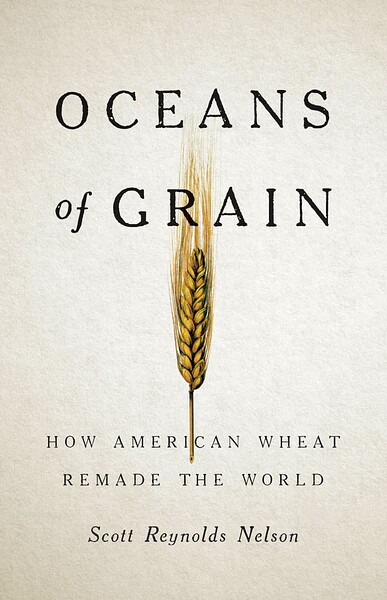Looking for a good read? Here is a recommendation. I have an unusual approach to reviewing books. I review books I feel merit a review. Each review is an opportunity to recommend a book. If I do not think a book is worth reading, I find another book to review. You do not have to agree with everything every author has written (I do not), but the fiction I review is entertaining (and often thought-provoking) and the non-fiction contain ideas worth reading.
Book Review
Wheat and its Role in Civilization
Reviewed by Mark Lardas
June 26, 2022
“Oceans of Grain: How American Wheat Remade the World,” by Scott Reynolds Nelson, Basic Books, 2022, 368 pages, $32.00 (Hardcover) $18.99 (ebook)
Do empires build trade routes or do trade routes build empires? Have the United States and Russia been locked in an economic rivalry since the 1860s? Was World War I triggered by international grain trade and the desire of Russia to control Constantinople?
“Oceans of Grain: How American Wheat Remade the World,” by Scott Reynolds Nelson, examines these questions and much more. It is a study of grain, its trade routes and the impact grain trading has had throughout history. Bread is the staff of life. Nelson follows it from prehistory to the present.
Nelson’s theme is simple: food production drives history. Abundance or absence creates or destroys empires, fuels economic and technological growth, and drives world history. Grain is the most important food. Storable and transportable it can be also be used to create more food, especially meat. The two biggest breadbaskets are the Ukrainian and US plains. There were others, but none as productive.
Nelson opens by showing how trading Ukrainian grain predated civilization, following oxcart trails across the Ukrainian steppes. Disease also followed these trails. Grain trading led to cities, which required food. Empires grew to ensure grain flowed. This led to bigger cities. These grew until reset by plague. The cycle then repeated itself. This pattern was followed from ancient Greece to Catherine the Great’s Russia. Russia grew rich exporting its grain to Western Europe starting in the eighteenth century.
Nelson also shows how the growth of the US affected this cycle. It produced a source of grain rivalling and surpassing the production of the Russian plains. America was more productive not just because of its soil, but because its free-market economy encouraged innovation and productivity. Following the Civil War the US powered past Russia. Despite the longer supply chain, its grain was cheaper.
The results are presented by Nelson. Grain dramatically dropped in price. Port cities exploded in importance. European nations – Britain, France, Germany, and Italy – industrialized, deemphasizing agriculture, using US and Russian grain to feed factory workers. Wars were won feeding troops imported grain. European grain powers, including Austria Hungary, Russia, and the Ottomans to lost wealth to US competition. Industrialized nations, especially Britain and Germany, became dependent on imported grain. Nelson asserts pressure to protect food lines led to World War I.
“Oceans: of Grain” is provocative. Well-researched and readable, Nelson has written a book which will fascinate both professional historians and ordinary readers.
Mark Lardas, an engineer, freelance writer, historian, and model-maker, lives in League City, TX. His website is marklardas.com. This review appeared in a different form in American Essence magazine and Epoch Times .
